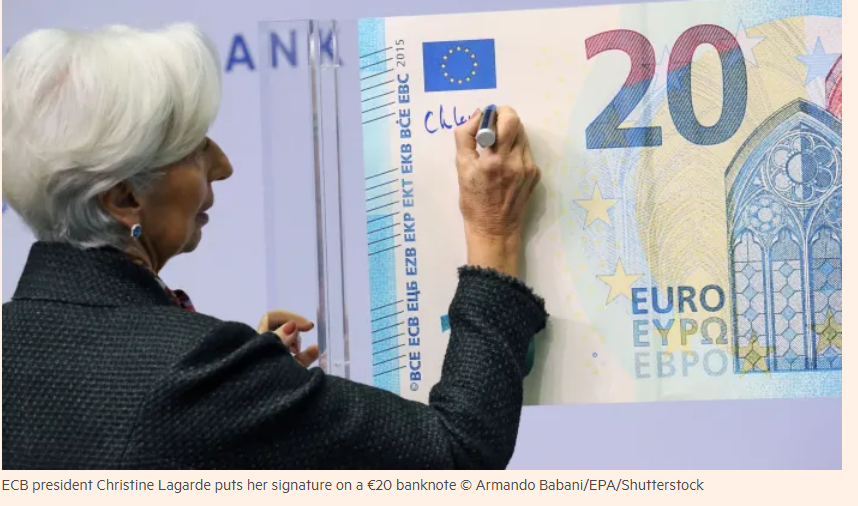Referatet fra ECBs decembermøde viser ifølge ING, at ECB endelig er vågnet op til realiteterne. Mens ECB gennem 2021 diskuterede, om den stigende inflation ville være et midlertidigt problem, så endte ECB med at erkende, at inflationen er blevet et større problem end hidtil troet – omend ECB ikke ligefrem siger, at en høj inflation er blevet permanent. ECB overså ganske enkelt, at der var en række fundamentale faktorer, som pressede inflationen op, også selv om lønstigningerne var moderate. De fundamentale forhold – såsom en mindre grad af globalisering og satsningen på grøn energi – kan føre til varige prisstigninger, og det kan føre til en vedvarende højere inflation. Men ECB tror, at den vil falde til 2 pct. i slutningen af året og vil holde sig under 2 pct. i de følgende to år. Derfor tror ING heller ikke, at ECB vil skride til rentestigninger før næste år.
What a difference a few months can make. Remember how in late summer 2021, the majority of the European Central Bank (ECB) members still warned against inflation in the long-run being too low and not too high. Back then, the main narrative of the ECB was that the period of higher inflation rates was expected to be short-lived. The ECB’s December meeting clearly marks an official end to this narrative.
The just-released minutes confirmed the main messages of the December press conference and more recent comments by ECB members. In fact, the ECB has left ‘team transitory’ but has not yet transferred into ‘team permanent’. An almost doubling of the inflation forecasts for 2022 and a much more differentiated debate on inflation illustrate that the ECB has finally woken up to reality; a reality of higher current headline inflation rates and an uncertain inflation outlook, which can still go in all kinds of directions.
Diving into the minutes shows a very interesting inflation debate. While the ECB’s base case scenario foresees inflation to drop below 2% towards the end of this year, and to stay slightly below 2% in 2023 and 2024, the ECB also discussed a scenario of higher inflation for longer.
The ECB also had a long-overdue discussion on its own inflation models, as suggested by comments like “it was reiterated that models calibrated on pre-pandemic data might not be well suited to capturing major structural changes or a potential switch from a lower to a higher inflation regime”.
Key for the future path of monetary policy seems to be wages, as the ECB expects “that higher inflation in the medium term was unlikely to come about without dynamic wage growth”. Up to now, the ECB has been very relaxed as actual wage growth had remained subdued.
However, as the labour market is already a lagging economic indicator and wage developments are even more lagging, the question is how informative current wage developments for a forward-looking monetary policy are.
While the ECB sounded very reconvinced in the summer and autumn of 2021, the minutes of the December meeting show more doubts and a better sense for the uncertainty that lies ahead. Not all ECB members had become hawkish, though. The minutes also showed that some ECB members warned against a premature scaling back of monetary stimulus and asset purchases.
All in all, the minutes of the ECB’s December meeting illustrate a more realistic debate on the several inflation scenarios, supporting the decision to scale back asset purchases in 2022.
The long way towards normality
Looking ahead, even if headline inflation could have reached its peak in December of last year, any drop in inflation will be limited. Companies will continue passing through higher production costs to consumers. Consumers in some eurozone countries will only be charged higher commercial energy prices this year, and the end of the current lockdown measures is likely to spur price mark-ups. A combination that will first broaden inflationary pressure before any significant drop could occur.
Still, on the back of negative base effects and an end of some pandemic-related price mark-ups, we expect headline inflation to gradually come down in the second half of the year.
The other story, however, is what will happen to inflation beyond the pandemic-related shifts. In our view, there is the risk that inflation will be driven by more structural factors, as much as disinflation over the last 15 years was also mainly driven by structural factors.
While disinflation was driven by globalisation, digitalisation and austerity, the coming years could see higher inflation on the back of deglobalisation, decarbonisation and demographics. For the ECB, this does not imply imminent policy rate hikes but rather a gradual return to normality. It starts with the current gradual reduction of asset purchases and will in our view continue with an end to net purchases towards the end of 2022 and a first rate hike in early 2023.











